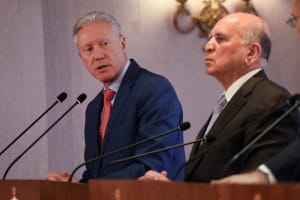Hamas rejects Turkish FM’s claims that Hamas, PA support Turkey-Israel diplomatic ties
Hamas has expressed concern about potential Turkish backlash following the restored Turkish-Israeli relations

The Gaza-ruling terrorist organization Hamas, which once enjoyed strong support from the government of Turkish President Recep Tayyip Erdoğan, reportedly fears a potential backlash from the newly restored diplomatic relations between Turkey and Israel.
Hamas officials reportedly are concerned that the restored ties will prompt Turkish pressure on Hamas, with Jerusalem having demanded repeatedly that Turkey close Hamas’ offices in its country.
The presence of senior Hamas terrorists in Turkey has been a source of serious friction between Ankara and Jerusalem, as Hamas has been long-committed to the destruction of the State of Israel and has engaged in extensive terrorist campaigns against Jews and Israelis.
While Turkey has signaled that it is turning a new page in its previously turbulent relations with Israel, senior Turkish officials have simultaneously stressed that the Arab populations in Gaza and the West Bank are in support of the diplomatic normalization process and that restored relations with Israel do not signal a change in Turkey’s Middle East policies.
“Resuming full diplomatic relations with Israel does not mean that Turkey will change its policies in the Middle East,” stated Turkish Foreign Minister Mevlüt Çavuşoğlu in a recent interview, in which he claimed that both Hamas and the Palestinian Authority supported the restored relations between Turkey and Israel.
“Palestinian Authority President Mahmoud Abbas and Hamas welcome the normalization of diplomatic relations between Turkey and Israel. Therefore, we will better defend the Palestinian cause, and this should not mean that Turkey will make concessions on the Palestinian issue,” Çavuşoğlu said.
However, in a released statement, Hamas denied the Turkish claim that it supports the improved relations between Turkey and Israel.
“Hamas denies media reports alleging that the movement ‘hailed’ Turkish normalization with the Israeli occupation,” read the Hamas statement, which stressed that diplomatic normalization with Israel undermines the interests of the wider Muslim Arab world.
“In this regard, we reaffirm our rejection of all forms of normalization as it contradicts [with] the Palestinian national constants and the interests of the Palestinian people, as well as the interests of the Arab and Muslim nations,” the Hamas statement said.
Hamas was at the center of the collapse of Turkish-Israeli relations in May 2010, when violent pro-Hamas Turkish activists clashed with Israeli naval forces on the Turkish ship Marmara as it illegally tried to reach the Gaza Strip by force.
Following a protracted process, Israel and Turkey announced on Aug. 17 the restoration of full diplomatic bilateral relations and the exchange of ambassadors between Ankara and Tel Aviv.
In a statement, Israeli Prime Minister Yair Lapid’s office hailed the restored relationship with Turkey, stressing that “the resumption of relations with Türkiye is an important asset for regional stability and very important economic news for the citizens of Israel. We will continue to strengthen Israel’s standing in the world."
While Erdoğan has a history of making vitriolic attacks on the Jewish state, the combination of a weak economy and increased diplomatic isolation for Turkey, in contrast to Israel’s status as a regional military and economic powerhouse, eventually forced Ankara to consider repairing its soured connection with Israel. Meanwhile, the Turkish government has gone above and beyond to signal continued support for the P.A.
Merely a week after Turkey and Israel announced restoring ties, Erdoğan welcomed P.A. leader Mahmoud Abbas in Turkey, a visit widely seen as Turkey signaling its continued support for the Abbas-led regime in Ramallah.
“Turkey defends its vision of a two-state solution on every platform, and we have clearly demonstrated our response to the Israeli attacks and civilian casualties,” Erdoğan said. The Turkish leader pointedly referred to Ramallah as “brothers” and stressed that Turkey would continue advocating a “solution to the Palestinian issue and [to] improve the situation of the Palestinian people.”

The All Israel News Staff is a team of journalists in Israel.














